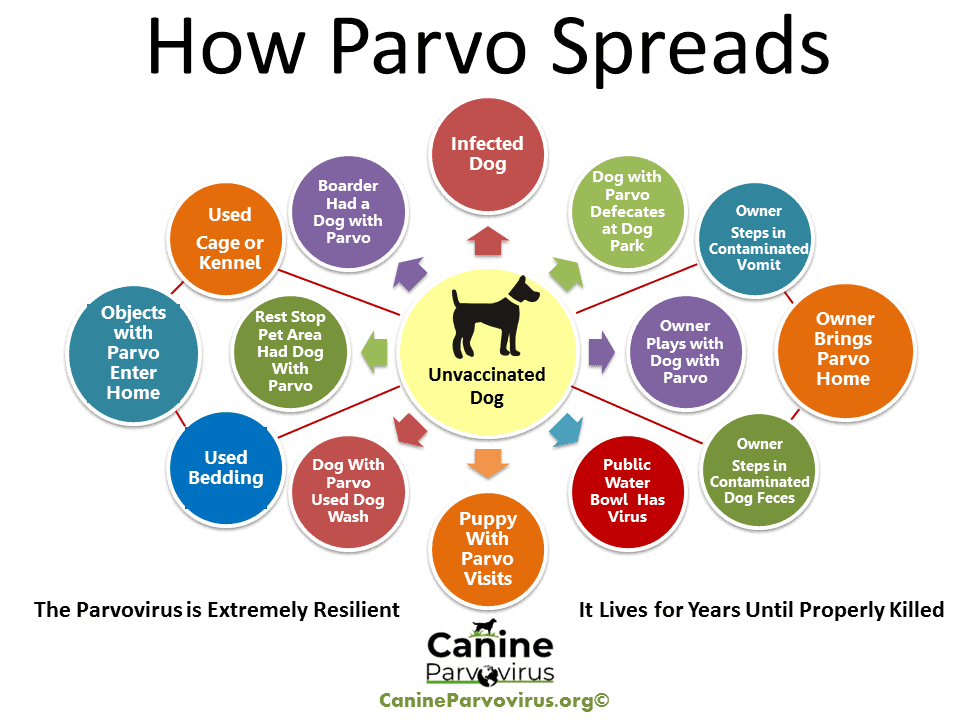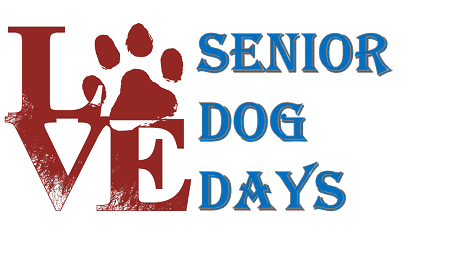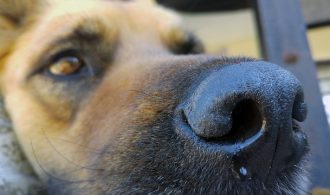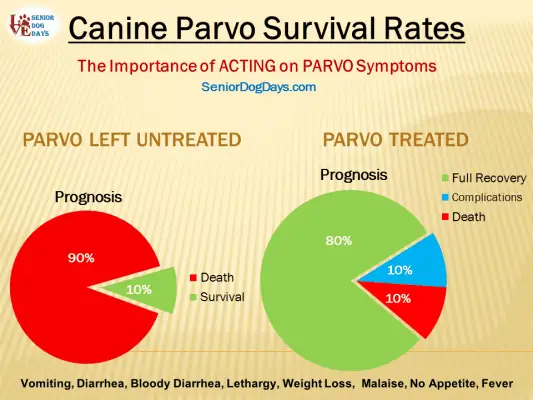Some content may contain affiliate links to products which means we could earn a fee on your purchase. Thank you for visiting
Parvo in old dogs can be extremely dangerous because it can be slightly harder to detect. If our older dog is not having symptoms of vomiting or diarrhea, it’s easy to associate lethargy and lack of appetite simply to our dogs being older.
On top of that, many dog owners think their old dog has zero chance of getting Parvo because they’ve been vaccinated, but:
Can older dogs get Parvo if they have been vaccinated? Yes, older dogs, senior dogs and young dogs can get Parvo even if they’ve been vaccinated and that’s why seeking treatment at the first signs of Parvo is so important.
Take a look at this chart to see the difference between survival rates of a dog that is treated for Parvo vs. a dog that goes untreated:
Left untreated, Parvo will lead to death in about 90% of its victims. So if you’ve been avoiding vaccinations or putting off Parvo boosters in your old or senior dog, it’s time for a refresher on the importance of Parvo protection for old dogs.
So What Is Parvo Again?
Parvo is a highly contagious virus. Kind of like the flu virus for humans but far deadlier.
It comes in two forms, one which presents in the intestines and digestive system and the other presents in the heart and cardiac system. The one we are talking about is the parvo that attacks the intestines and digestive system.
Is Parvo Common in Old Dogs?
The age of your adult dog is not a determining factor for whether or not she is more susceptible to Parvo. Whether your old dog is 8 or 14 years old, if she has not been vaccinated or has not maintained her scheduled boosters, she is not protected against Parvo.
Parvo is most common in puppies but not because puppies are young, but because puppies gradually lose their mother-given immunity to defend against parvo and until a puppy receives his vet-given vaccine, he will be highly susceptible.
Certain breeds such as rotties, pitbulls, shepards, retrievers, pinchers, are more susceptible to contracting Parvo, but no dog is safe.
Can an Older Dog Get Parvo after Vaccination
In spite of proper vaccination, a small percentage of dogs do not develop protective immunity through vaccination. If a dog does not respond to the vaccination as expected, they remain susceptible to infection if they come into contact with canine parvo viral particles.
How Parvo is Transmitted in Old Dogs
Transmission of Parvo in old dogs is not any different than how it’s transmitted in younger dogs. It is simply a matter of your dog being exposed to either:
- A dog or puppy that has Parvo – sniffing feces or another dog’s anus is the number 1 way for an old dog to contract Parvo. And its good reason to NOT allow this behavior on walks or in parks.
- An Object that is Contaminated with the Parvo Virus – Like a person’s shoes, a person’s jeans, a kennel mat, blanket, couch, rug, grass, soil, toy etc.,
Parvo can be transmitted to an old dog by any person, animal or object is contaminated with the Parvo virus.
The Parvo virus can live for over a year on objects, patiently waiting for its next host.

Graphic attributed to Canineparvovirus.org.
How Does Parvo Present in Old Dogs
Not all adult dogs will show symptoms of having Parvo. If they do, the symptoms are the same for dogs of any age. This becomes problematic in older dogs because we more readily dismiss moments of lethargy and loss of appetite.
It is critical to take these signs seriously, especially when accompanied by any other symptoms.
- Vomiting
- Bloody Stool
- Diarrhea – Can Be Severe
- Fever
- Loss of Appetite
- Weight Loss
- Lethargic, No Energy.
Can an Old Dog Get Parvo Twice?
The majority of dogs who receive prompt hospital treatment (about 80%) will survive Parvo. It’s highly unlikely that a dog who defeats Parvo will get Parvo again. However, Parvo can cause a weakened immune system which impacts your dog’s ability to overcome other illnesses and parvo virus comes in different strains.
If you dog is exposed to a new strain of canine parvo, she may not be protected against the new strain.
Cleaning after Parvo
Parvo is not an easy virus to kill. Here are 4 products known to kill the canine Parvo virus:
- Bleach
- Accelerated Hydrogen Peroxide (NOT regular peroxide)
- Potassium Peroxymonosulfate
- Chlorine Dioxide
Bleach – is a great disinfectant and has been proven to kill Parvovirus, but it’s fumes are dangerous and it isn’t safe on all surfaces. Use bleach where you can such as when laundering bedding. If you don’t care about discoloration, use it in spray bottle 30 parts water to 1 part bleach.
Wear a good respirator and get cleaning. Make sure your dog is safe from the fumes. Buy NEW bleach, do not use the bottle that’s been sitting around your home and make sure it’s labeled for killing canine parvovirus.
Accelerated Hydrogen Peroxide – This is not the readily available hydrogen peroxide you buy in a bottle at the drugstore. Accelerated Hydrogen Peroxide is what’s used in hospitals and vet offices along with or Potassium Peroxymonosulfate.
Then there is Sniper which is more expensive than bleach, but less expensive than accelerated hydrogen peroxide and potassium peroxymonosulfate. Sniper can be used on everything…lawns, clothing, carpets…even the infected dog.
You can read our full guide on parvo cleaning products here where you’ll also find links to the products: Products Besides Bleach that KILL Parvo.
The non bleach products are a bit safer to use around the house than bleach and KILLS the Parvo Virus. They are gentle on humans and animals and is designed for use in animal housing facilities in between patients. It was not always available to the public, but now is.
Key to Preventing Parvo in Old Dogs
Make sure your dog is properly vaccinated. Since parvo is HIGHLY contagious the only real way to keep your old or senior dog from getting Parvo is through vaccination and supplemental, scheduled boosters. There is no home remedy for preventing Parvo and with a mortality rate of 90% when left untreated, proper vaccination is the best way to protect your older dog from Parvo.
Limit your Older Dog’s Interactions with Puppies – Because Parvo vaccinations require boosters, it’s quite possible your dog’s vaccine against Parvo could be ineffective as he approaches his scheduled booster. Since puppies are the #1 carriers of Parvo, it makes sense to keep your older dog away from puppies as they approach their booster dates.
Exercise Caution Around Vaccine Booster Dates – Always put your older dog’s booster shot in a calendar 6 months BEFORE the actual booster. This way, you can remind yourself that your dog’s Parvo vaccine may be losing its effectiveness.
During this time frame consider avoiding dog parks, pet stores, play dates and maybe even rein in the leash on her walks.
Stop the Spread – If you work or spend time in places where you have contact with dogs, or even if you’ve been visiting a dog shelter,change your clothes and shoes before returning home to your older dog.
Keep Parvo Killing Cleaners on Hand – If you suspect your house or yard has been infected, or your neighborhood is experiencing an outbreak it will be beneficial to have these parvo killers on hand.
Adopting – so many people like the idea of getting a puppy to keep their older dog company. If you are considering adopting a puppy, or any dog for that matter make sure the puppy or dog is vaccinated against Parvo and has had enough time for the vaccination to take effect. At least 6 weeks.
Conclusion
Don´t trust home remedies for Parvo prevention or for treating Parvo symptoms. With a 90% mortality rate when left untreated, a “wait and see” approach when your dog shows Parvo symptoms could be the difference between life and death.
Once your dog gets the proper medical attention, it’s very likely your vet will assign some home therapies (based on your comfort and ability). Sub-q fluid treatments might be recommended along with special diet or drinks. But always, always take your dog to the vet as soon as possible.


